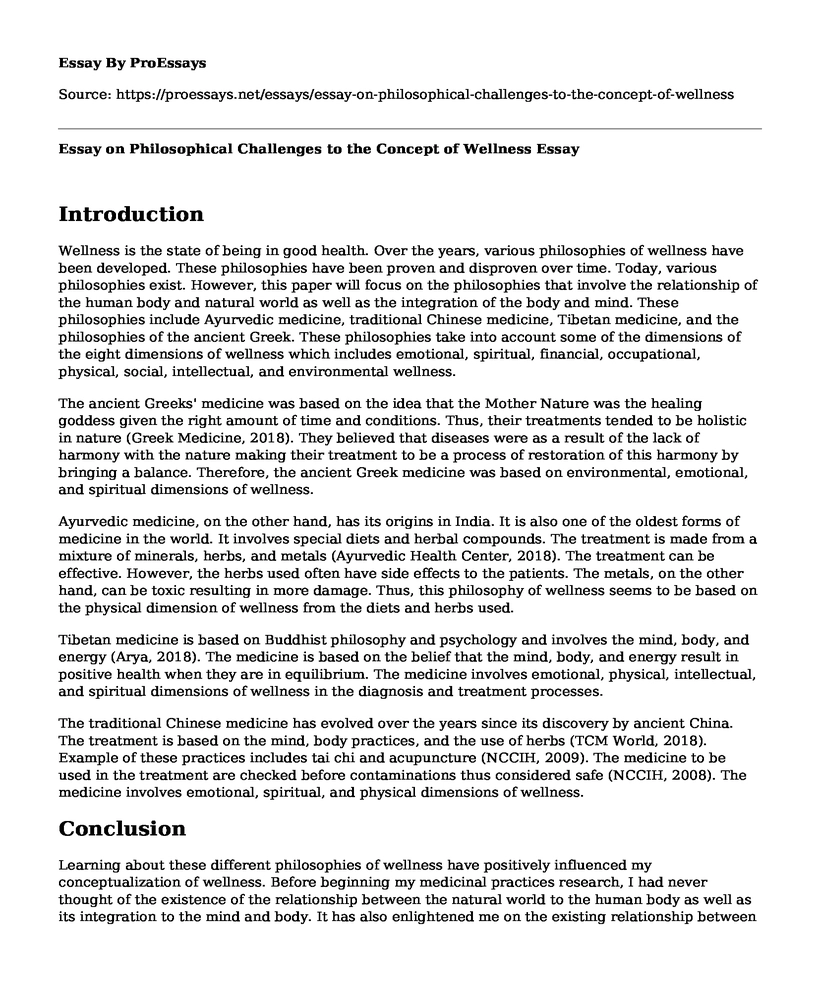Introduction
Wellness is the state of being in good health. Over the years, various philosophies of wellness have been developed. These philosophies have been proven and disproven over time. Today, various philosophies exist. However, this paper will focus on the philosophies that involve the relationship of the human body and natural world as well as the integration of the body and mind. These philosophies include Ayurvedic medicine, traditional Chinese medicine, Tibetan medicine, and the philosophies of the ancient Greek. These philosophies take into account some of the dimensions of the eight dimensions of wellness which includes emotional, spiritual, financial, occupational, physical, social, intellectual, and environmental wellness.
The ancient Greeks' medicine was based on the idea that the Mother Nature was the healing goddess given the right amount of time and conditions. Thus, their treatments tended to be holistic in nature (Greek Medicine, 2018). They believed that diseases were as a result of the lack of harmony with the nature making their treatment to be a process of restoration of this harmony by bringing a balance. Therefore, the ancient Greek medicine was based on environmental, emotional, and spiritual dimensions of wellness.
Ayurvedic medicine, on the other hand, has its origins in India. It is also one of the oldest forms of medicine in the world. It involves special diets and herbal compounds. The treatment is made from a mixture of minerals, herbs, and metals (Ayurvedic Health Center, 2018). The treatment can be effective. However, the herbs used often have side effects to the patients. The metals, on the other hand, can be toxic resulting in more damage. Thus, this philosophy of wellness seems to be based on the physical dimension of wellness from the diets and herbs used.
Tibetan medicine is based on Buddhist philosophy and psychology and involves the mind, body, and energy (Arya, 2018). The medicine is based on the belief that the mind, body, and energy result in positive health when they are in equilibrium. The medicine involves emotional, physical, intellectual, and spiritual dimensions of wellness in the diagnosis and treatment processes.
The traditional Chinese medicine has evolved over the years since its discovery by ancient China. The treatment is based on the mind, body practices, and the use of herbs (TCM World, 2018). Example of these practices includes tai chi and acupuncture (NCCIH, 2009). The medicine to be used in the treatment are checked before contaminations thus considered safe (NCCIH, 2008). The medicine involves emotional, spiritual, and physical dimensions of wellness.
Conclusion
Learning about these different philosophies of wellness have positively influenced my conceptualization of wellness. Before beginning my medicinal practices research, I had never thought of the existence of the relationship between the natural world to the human body as well as its integration to the mind and body. It has also enlightened me on the existing relationship between the ancient medicine and the modern medicine. It is also fascinating that none of the existing philosophies involves all the eight dimensions of wellness.
References
Ayurvedic Health Center (2018). Determine Your Dosha. Ayurvedichealthcenter.com. Bellingham, WA. Retrieved 28 March 2018, from https://www.ayurvedichealthcenter.com/ayurveda/determine-your-dosha/
Arya, D. (2018). The Tibetan Medicine. Tibetanmedicine-edu.org. Retrieved 28 March 2018, from https://www.tibetanmedicine-edu.org/index.php/the-tibetan-medicine
Greek Medicine (2018). Welcome to Greek Medicine. Greekmedicine.net. Retrieved 28 March 2018, from http://www.greekmedicine.net/introduction.html
NCCIH (2008). Ayurvedic Medicine: In Depth. Retrieved 28 March 2018, from https://nccih.nih.gov/health/ayurveda/introduction.htm
NCCIH. (2009). Traditional Chinese Medicine: In Depth. Retrieved 28 March 2018, from https://nccih.nih.gov/health/whatiscam/chinesemed.htm
TCM World. (2018). What Is TCM? TCM World. Retrieved 28 March 2018, from https://www.tcmworld.org/what-is-tcm/
Cite this page
Essay on Philosophical Challenges to the Concept of Wellness. (2022, Apr 16). Retrieved from https://proessays.net/essays/essay-on-philosophical-challenges-to-the-concept-of-wellness
If you are the original author of this essay and no longer wish to have it published on the ProEssays website, please click below to request its removal:
- What Is a Human? Essay Example
- Essay Sample on Moral Principles to Moral Dilemmas in Medicine
- Essay on Finding Meaning in Life: Frankl's Theories on Purpose and Hope
- Essay Example on Frustration: Seneca's Lessons to Guide Us Through Tough Times
- Moral Values: Essential for Society's Professionalism and Unity - Essay Sample
- Living Ethically: Applying Ethics to Decision Making - Essay Sample
- Paper Example on Ethical Relativism: Varying Perspectives on Morality







